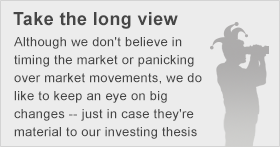
The Dow Jones Industrial Average (DJINDICES: ^DJI) reached a new intraday record Monday morning, flying back above 17,000 on triple-digit gains. The S&P 500 (SNPINDEX: ^GSPC) followed closely behind, moving 60 basis points higher.
The banking sector led the way following a better-than-expected Q2 earnings report from Citigroup (C +1.01%) that included a $7 billion settlement with the Department of Justice. The settlement ends investigations into fraudulent mortgage practices dating back to before and during the financial crisis. The bank's stock moved over 3.5% higher.
On the news, Bank of America (BAC +0.79%), which reports its own second-quarter results on Wednesday morning, moved 1.7% higher.
Citigroup and Bank of America have been the two poster children for poorly run megabanks over the past six years. Today, though, as both banks agree to settlements with regulators, investors are increasingly focusing on their steadily improving fundamentals instead of the uncertainty surrounding these multibillion-dollar investigations.
Focusing on Citi's results

Citi reported revenue of $19.3 billion for the quarter. Earnings were $181 million, or $0.03 per diluted share. For the comparable quarter in 2013, revenue was $20.5 billion and earnings were $1.34 per share.
The primary driver of the earnings decline was a $3.8 billion charge related to the settlement announced today. That charge was accounted for in Citi Holdings, the division of the bank that holds the remaining legacy assets from the real estate bubble and financial crisis. Citi Holdings was separated from the rest of the bank several years ago to delineate the "good bank" from the "bad bank" in the minds of investors.
Excluding the settlement costs, Citi Holdings would have shown a profit of $244 million for the quarter. Management said the company expects the "bad bank" to actually be profitable for the remainder of the year. The division reported that past-due loans greater than 90 days declined 22% year over year -- another encouraging sign.
Despite the low level of earnings, Citigroup was still able to increase its Basel III capital ratio -- an important indicator of the bank's ability to weather another economic crisis -- to 10.6%. From a risk perspective, the higher the capital ratio, the better.
These results -- better than expected but still short on growth -- are viewed in light of the likely change in Federal Reserve interest rate policy. When rates rise in the next 12 to 24 months, banks will see a healthy boost to revenues and margins as loans and investments reset their rates and boost yields.
What to look for this week

Now that Citigroup has reported, all eyes now turn to Bank of America. Citi's results today likely raise the bar for B of A, as the banking world tends to look at these two banks together, given their troubled loan portfolios and seemingly endless settlements, fines, and set backs.
While the other largest banks have largely moved on from the financial crisis, problems still linger in Citi's "bad bank" and at B of A. For investors, the sooner these two banks can work out the problems, finalize the settlements, and put the past behind them, the sooner they can focus on the future of banking -- an exciting prospect for bankers, consumers, and investors.